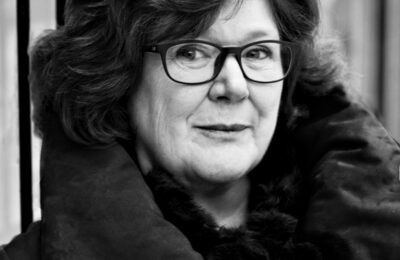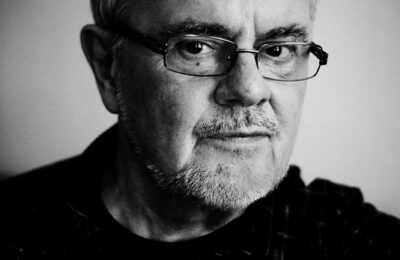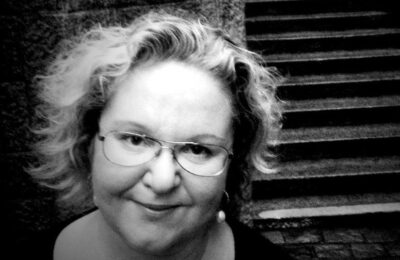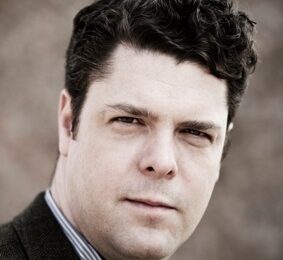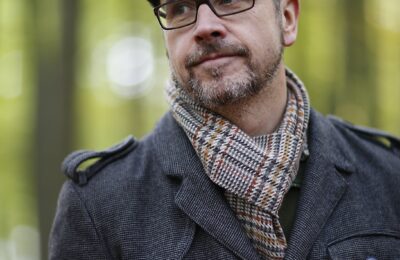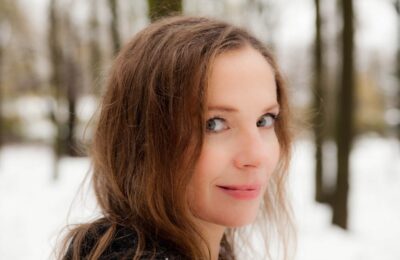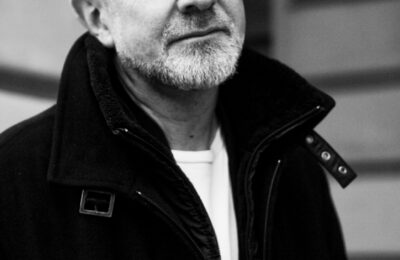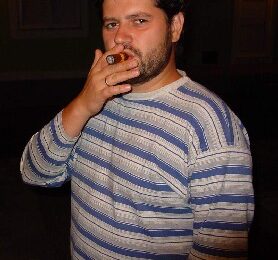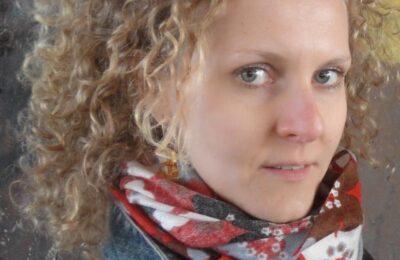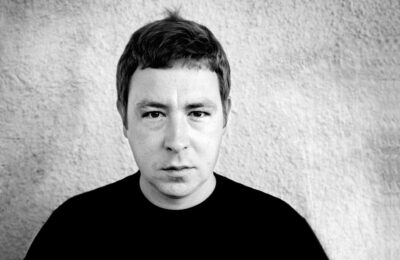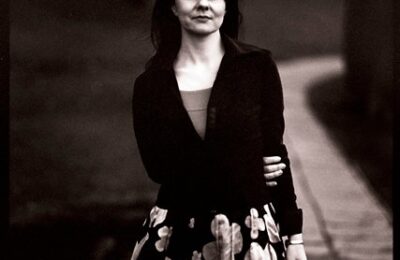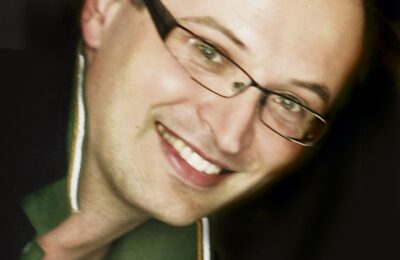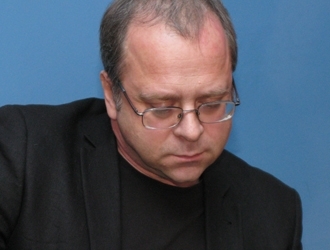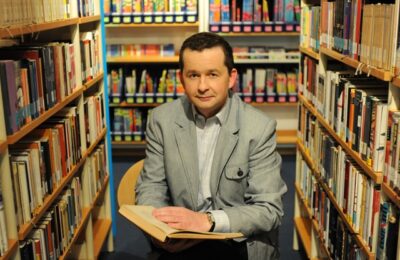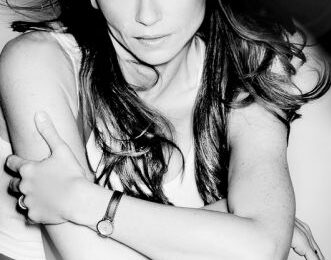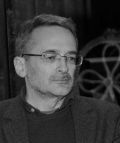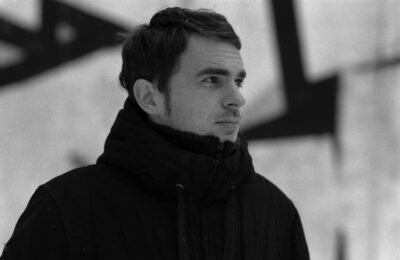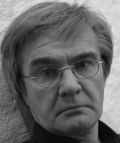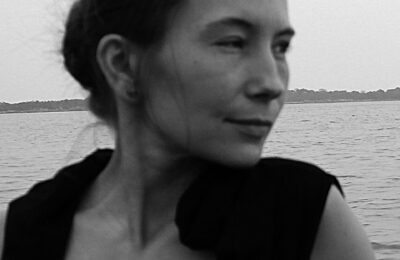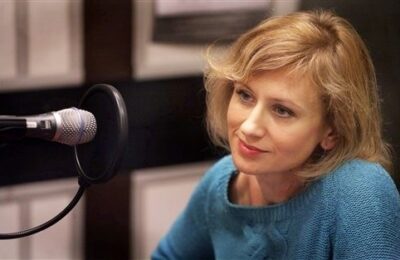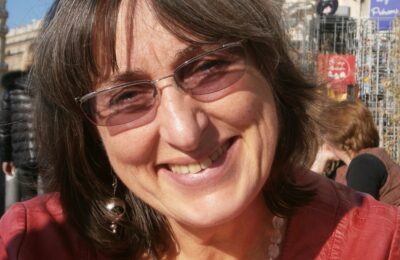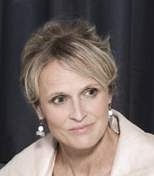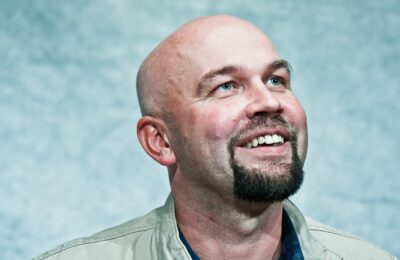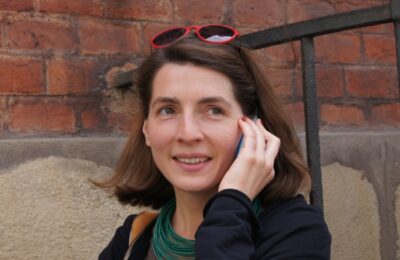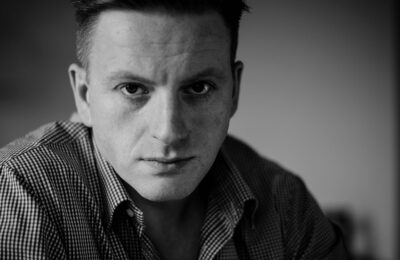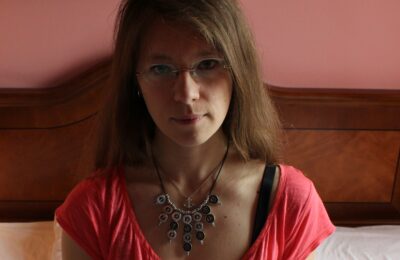
Guests from abroad
Majgull Axelsson (born in 1947) is a Swedish writer, journalist, author of reportages, journalistic books and columnist in “Dagens Nyheter”. Her first book, “Far away from Nifelheim”, was awarded with the Moa Martinsson Prize and has won acclaim worldwide. Her next novel, “April Witch”, got the most important Swedish literary award—Augustpriset (a Swedish equivalent of Pulitzer), it was translated into more than twenty languages and has become a bestseller. Her other books published in Poland are “Random House”, “The Woman I Never Was” and “Ice and Water, Water and Ice”. In April, the W.A.B. Publishing House issued her latest novel, “Moderspassion”. It would be great if “axelssonism” or the fashion for interesting, complicated heroines entered the literary world for good because this Swedish writer can write about women in such a way that it is difficult to run away from her them. (Justyna Sobolewska, “Tygodnik Powszechny”)
Photo by Cato Lein
Agnes Banach (born in 1980) is a Norwegian literary scholar; she teaches at the University of Oslo and works as a translator. She has translated into Norwegian e.g. Pod Mocnym Aniołem by Jerzy Pilch and “Dziennik” by Gombrowicz (1953-1958). Now she is working on the second part of “Dziennik” and the latest novel by Michał Wikowski, “Drwal”.
Photo Erika Hebbert Larsen
Anders Bodegård (born 1944) is a Swedish translator of Polish and French literature. He has always been interested in learning foreign languages; he studied Slavic in Stockholm and French in Paris; he taught foreigners Swedish and he was a teacher of Swedish in Lyon and Cracow. He started translating in Cracow; his first translated book was Etyka Solidarności by Józef Tischner (1984). He also worked on poetry by Zagajewski, Szymborska and Lipska and on prose and drama by Huelle, Michnik and Gombrowicz (Dziennik, Trans-Atlantyk, Iwona księżniczka Burgunda, Ślub). From French he translates mostly drama and prose (Racine, Molière, Musset, Rouaud, Houellebecq); his latest translation is “Madame Bovary”. He was one of the founders of Ryszard Kapuściński Prize for literary reportage. He is the chapter member of The Wisława Szymborska Award Committee.
Photo by Cato Lein
Irena Grönberg is a poet and translator of Polish literature. She translated poems by Tadeusz Różewicz, Zbigniew Herbert, Krystyna Miłobędzka, Dariusz Suska, Tadeusz Dąbrowski and Julia Fiedorczuk. She is an editor of anthology of Polish poetry “17 polska poeter”, in which there are also her translations. Coeditor and one of translators of the collection of short stories “Polen berättar”, “Navelsträngen i jorden” and the collection of poetry by twenty women poets “Jag i första och sista person”. She is a translator of prose by Wilhelm Dichter i Joanna Olczak-Ronikier. Now, together with Lisa Mendoza Åsberg, she is working on a Swedish collection of poems by Anna Świrszczyńska. Grönberg was born in Radom and went to Sweden as a child, in 1969. She has been living in Stockholm for many years.
Photo by Cato Lein
Stefan Ingvarsson is a translator and columnist specializing in cultural issues. Vice Chair of The Swedish Association of Writers, in which he represents Swedish translators of fiction. He is currently running an international festival of literature in Moderna Museet in Stockholm and writes for „Expressen” and „Sydsvenskan”. He worked for publishing houses; lately for one of the two biggest in Sweden, Norstedts. He has been translating Polish literature into Swedish since 2004 (both poetry and prose; e.g. Witold Gombrowicz, Michał Witkowski). Together with Irena Grönberg, he was an editor of an anthology of Polish prose after the year 1989 and anthology of poetry by women poets.
Photo by Cato Lein
Cato Lein (born in 1957 in Båtsfjord, Norway) is one the most famous Swedish portrait photographers. He has been living in Sweden since 1980s. Lein tends to use analogue technique mostly. He specializes in photos of writers (Paul Auster, Zadie Smith, Ryszard Kapuściński, Umberto Eco, Salman Rushdie, Susan Sontag, Czesław Miłosz and Orhan Pamuk). His photos are often compared to works by famous photographers such as Robert Frank, Richard Avedon or Anton Corbijn. At the same time, his photographs are unique and break many classical rules of portrait photography.
Photo by Jeanette Hägglung
Polish guests
Joanna Bator (born in 1968) is a culture expert and philosopher by education. She abandoned university career for literature. She is a columnist in “Gazeta Wyborcza” and an enthusiast and expert of Japanese culture. She got Beata Pawlak Prize for “Japoński Wachlarz”. In 2009, W.A.B. Publishers issued her novel “Piaskowa Góra” nominated for NIKE and GDYNIA awards. A year later its sequel, “Chmurdalia”, reached the final of next edition of NIKE. “Piaskowa Góra” was translated into German, Hungarian and Hebrew. Its German version reached the final in German International Literary Award. Its French, Croatian and Macedonian translations are being prepared. In autumn 2012 a German version of “Chmurdalia” was published. Her latest novel, “Ciemno, prawie noc” was released in autumn 2012.
Photo by Adam Golec
Marek Bieńczyk (born in 1956) is a writer and translator. He translated e.g. Milan Kundera, Emila Cioran, Roland Barthes. He published his two novels “Tworki” and “Terminal” and collections of essays “Czarny człowiek” and “Melancholia. O tych co nigdy nie odnajdą straty”, “Kroniki wina”, “Oczy Durera”, “Przezroczystość” and “Książka twarzy”, for which he got a NIKE prize in 2012.
Photo by Cato Lein
Wojciech Charchalis is a literary scholar and translator of Spanish and Portuguese literature. He works in the Portuguese Department in the Institute of Romance Studies at Adam Mickiewicz University. Author of “El realismo mágico en la perspectiva europea – El caso de Gonzalo Torrente Ballester” (Peter Lang, New York 2005). He translated José Saramago and Fernanda Pessoa and from Spanish: “Winter in Lisbon”, “Prince of Shadows”, and “El jinete polaco” by Antonio Muñoz Molina, “All Souls” by Javier Marías, “The King Amaz’d: A Chronicle and The Island of Cut Hyacinths” by Gonzalo Torrente Ballester and “Death in the Andes” by Mario Vargas Llosa. He got the Cervantes Institute Prize for his translation of “Makbara” by Juan Goytisolo. He is working on a new translation of “Don Quixote”.
Justyna Czechowska (born in 1979) is a literary scholar, organizer of cultural events, translator from Swedish and Norwegian, author of articles, anthologies and interviews. Co-founder of the Literary Research Foundation and Association of Literary Translators. Justyna Czechowska teaches creative writing and works as a literary agent. Her translations were published in Polish and Scandinavian magazines.
Tadeusz Dąbrowski (born in 1979) is a poet, essayist, literary critic, editor of a literary bimonthly “Topos”. He published his poems in Polish and foreign magazines and newspapers (“Tygodnik Powszechny”, “Polityka”, “Gazeta Wyborcza”, “Zeszyty Literackie”, “Twórczość”, “Odra”, “American Poetry Review”, „Boston Review”, „Harvard Review”, „Akzente”, „Sprache im technischen Zeitalter”). Recipient of scholarships from Vermont Studio Center, Internationales Haus der Autoren Graz, Polish Minister of Culture, Literarisches Colloquium Berlin, Marshal of the Pomorskie region, and the Baltic Centre for Writers and Translators. He won The Kościelski Prize (2009), Hubert-Burda-Preis (2008), Splendor Gedanensis Prize (2007), GTPS Prize (2007), Gdańsk Prize for Young Artists (2002). He was nominated for NIKE Prize (2010) and Pegaz Prize (2002). In 2006, got a Polish Cultural Foundation Prize from Tadeusz Różewicz. He took part in numerous meetings and festivals in Poland and abroad. His poetry has been translated into twenty languages. He published five collections of poems (lately “Black Square”). Editor of “Anthology of Poems 1976-2006. Poza słowa” (2006). Collections of his poems were published in Germany and the USA. He lives in Gdańsk.
Photo by Magdalena Małyjasiak
Jacek Dehnel (born in 1980) is a Polish poet, fiction writer, translator, graphic artist and painter. He published six collections of poetry, three translations, two collections of short stories, two short fiction collections on photographs and maps, a collection of mininovels and two novels. His works have been translated into many languages. Dehnel is a winner of numerous literary awards. He got The Kościelski Prize (2005) and Paszport Polityki Prize (2006); he was nominated for Nike Prize twice. He wrote for Wirtualna Polska (“Books” column) and for “Polityka” (“Kawiarnia literacka”).
Photo by Cezary Rucki
Anna Dziewit-Meller is a journalist and writer. She has been recommending good books in Dzień Dobry TVN for five years. She worked for “Lampa”, “TVN Style” and Chillizet and Zet radio channels. She is a frontwoman and guitarist of the band Andy. Together with Agnieszka Dorotkiewicz, she wrote “Głośniej! Rozmowy z pisarkami” and “Teoria Trutnia i inne”. Rozmowy z mężczyznami and with Marcin Meller – “Gaumardżos. Opowieści z Gruzji.” In 2012, she published a novel “Disko”. She runs a blog: plain-pleasures.blog.onet.pl.
Photo by Michał Mutor
Julia Fiedorczuk (born in 1975) is a writer, translator, assistant professor in the English Institute at the University of Warsaw. She has published five poetry books (the latest is “Tuż tuż”, 2012), a collection of stories (“Poranek Marii”, 2010) and a novel (“Biała Ofelia”, 2011). Her translations of American poets (e.g. Wallace, Stevens, John Ashbery, Lisa Jarnot) appeared in “Literatura na Świecie ”; Fiedorczuk published two volumes of translations of selected works by Laura (Riding) Jackson and—together with Laura Anderson—a book “Język przeszłości”. She got numerous prizes: PTWK Debut Prize (2003) and Hubert Burda Prize (Vienna 2005). Fiedorczuk is involved in promoting ecopoetics. She deals with feminist criticism and ecocriticism, especially in literary studies. She publishes her reflections on womanhood in “Zadra”.
Photo by Cato Lein
Barbara Gawryluk is a journalist, translator, children’s writer. She graduated from Jagiellonian University as a Swedish scholar. She has translated Swedish literature for children, e.g. the series about Tsasiki by Moni Nilsson and “LasseMajas detektivbyrå” by Martin Widmark. She runs literary programs in Cracow Radio.
Photo from Cracow Radio archive
Magdalena Heydel is a translator and translation theorist. She translated a diary, the only drama and a collection of short stories by Virginia Woolf, “The Heart of Darkness” by Conrad, essays and some poems by Seamus Heaney and other poets, e.g. by Derek Walcott, Jane Hishfield and Robert Hass. She has also translates books for children. She teaches translation theory at the University of Warsaw and is an editor of a translation journal “Przekładaniec”.
fot. Cato Lein
Grzegorz Jankowicz (born in 1978) is a philosopher of culture, literary critic and translator. He deals with the 20th century literature, critical theories, popular culture, contemporary Polish poetry and the relations between literature and visual media. He has translated into Polish e.g. A. Manguel, R. Firbank, G. Perec, R. Rorty , S. Žižek and Gerard Mannix Flynn. He works for the Centre for Advanced Studies in the Humanities at the Jagiellonian University. A co-host of TV shows broadcast by TVP Kultura, including “Czytelnia” and “Poezjem”, in which he ran his original series “Nasłuch” and now he hosts discussions about literature. He was an editor of the literary criticism series “Punkt Krytyczny” and “the Studium” magazine. He taught Polish literature at Indiana University in Bloomington. Jankowicz cooperates with the Korporacja Ha! Art Foundation as a Deputy President and editor of two series: “Linia krytyczna” and “Proza obca”. Editor of the cultural section in “Tygodnik Powszechny”. A jury member for the SILESIUS Wrocław Poetry Award. He is an Executive Director of Conrad Festival in Cracow, After Schulz Festival in Chicago and International History Festival “Anamneses” in Wrocław. He lives in Cracow.
Photo by Grażyna Makara
Jerzy Jarniewicz (born in 1958) is a poet, translator, and literary scholar. Associate professor at the University of Łódź and Warsaw, where he teaches English literature. He is an editor of the literary translation journal “Literatura na Świecie”. A member of Gdynia Literary Prize Chapter since 2006. He has published eleven volumes of poetry, his best-known collections being “Oranżada” (2005), “Makijaż” (2009) and “Na dzień dzisiejszy i chwilę obecną” (2012) and nine volumes of literary criticism on literature in English, e.g. on Philip Larkin and Seamus Heaney poetry, but also a collection of essays on literary translation entitled “Gościnność słowa” (2012). In his broad collection of translations, we can find “A Portrait of the Artist as a Young Man” by James Joyce, “A Boy’s Own Story” by Edmund White, “Patrimony: A Memoir” by Philip Roth and “The Sea” by John Banville, short stories by Raymond Carver and the biography of Bob Dylan. He was nominated for Nike Prize in 2008. He lives in Łódź.
Photo by Nina Łupińska
Zbigniew Kruszyński is a writer and translator, one of the most acclaimed prose writers of his generation. He published “Schwedenkräuter”, “Historical Sketches”, “The Last Report”. Kruszyński is the winner of numerous awards: Brulion, Foundation of Culture, Polish Association of Book Publishers and the Andrzej Kijowski Prize. For many years, he ran translation workshops in Södertörns högskola in Stockholm. A member of Gdynia Literary Prize Chapter. He translated from Swedish, e.g. Bodil Malmsten, Marie Lundquist, Lars Gustafssona and Carl-Hening Wijkmark.
Photo by Jerzy Medyński
Tomasz Kuźmicki (born in 1975) is a lawyer and economist by education, but a publisher by avocation. One of cofounders of EneDueRabe Publishing House, which specializes in children’s literature. Kuźmicki has a passion for interesting literature for children; he has organized numerous events connected with this topic.
Marcin Miłkowski (born in 1976) is a philosopher, lexicographer and technical and scientific translator. He works for the Institute of Philosophy and Sociology of the Polish Academy of Sciences. He translated books by David Chalmers, Daniel Dennett i Ernst Mach. He has drawn up Dictionary of Telecommunications and Computers. Miłkowski wrote a widely available Polish morphosyntactic dictionary called Morfologik, a Polish thesaurus and he is one of the programmers of grammatical proofreader LanguageTool, in which he described rules governing the Polish language. Together with Dariusz Jemielniak, he is an editor of “Wielki słownik angielsko-polski” (ling.pl, Wiedza Powszechna). Cooperating with the Linguistic Engineering Group, he wrote a report The Polish Language in the Digital Era available for free here.
Sławomir Paszkiet (born in 1973) graduated from Scandinavian studies in Wrocław. A former director of The Dutch Culture Centre at the University of Wrocław, a cultural and press attaché of the Embassy of the Kingdom of the Netherlands in Warsaw and a director of the Polish Chamber of Books. He promotes Dutch literature in Poland. As a vice chair of the Protection of Common Cultural Heritage Foundation, he tries to save the remains of the Dutch settlement in Poland and promote Polish heritage abroad. By avocation, Paszkiet is a translator of Dutch literature. He is a member of Literary Translators Association, where he fights for the status of translators, whose role is often neglected in promoting literature. A Ph.D. student in UNESCO Chair for Translation Studies and Intercultural Communication of the Jagiellonian University.
Photo by Grzegorz Krzyżewski
Grażyna Plebanek is a writer, author of best-selling novels “Illegal Liaisons”” (2010), “Dziewczyny z Portofino” (2005), “Box with Stilettos” (2006), “Przystupa” (2007). Author of short stories which were published in the following anthologies: Dziewczyńskie bajki na dobranoc”, “Nie pytaj o Polskę” (AMEA 2008), “Zaraz wracam” (2008), “Projekt mężczyzna” (2009), “Piątek 2:45” (2010) and “Zachcianki” (2012). Plebanek graduated from the University of Warsaw as a Polish scholar. She worked for Reuters and “Gazeta Wyborcza”. A columnist for “Polityka”, “Wysokie Obcasy”, “Lampa”, “Newsweek”, “Elle”, “Pogranicza”, “Trendy”. She comes from Warsaw, lived in Stockholm for five years, and now has been living in Brussels since 2005.
Photo by Marta Wojtal
Adam Pomorski (born in 1956) is a translator, essayist, and historian of the idea, a chairman of the Polish PEN Club. He graduated from Sociology at the University of Warsaw. Translator of Russian poetry and prose, English, German, Belarusian and Ukrainian poetry. Pomorski is a winner of the Minister of Culture and National Heritage Award and the Polish PEN Club Award, the Association of Polish Translators and “Literatura na Świecie” for his whole work in translating poetry.
Maciej Robert (born in 1977) is a poet, literary and film critic. He published three collections of verse: Pora deszczu (2003), Puste pola (2008), and Collegium Anatomicum (2011 – Polish Association of Book Publishers Prize for the best verse collection in 2010/2011). His poems have been translated into English, Croatian, Spanish, German, Serbian and Hungarian. He published reviews, essays and interviews e.g. in “Przekrój”, “Kino”, “Dziennik Polska-Europa-Świat”, “Newsweek”, “Notes Wydawniczy”, “Kwartalnik Filmowy” and “Życie Warszawy”. Now he works for “Polityka”, “Nowe Książki” and “Lampa”. He runs a blog devoted to literary criticism on the literature of Central Europe “Czytam centralnie” connected with Angelus Literary Prize.
Photo by Elżbieta Lempp
Stanisław Rosiek (born in 1953) is a literature historian, essayist, and editor. He works in the Institute of Polish Philology at the University of Gdańsk. He worked in the editorial offices of the following magazines: “Litteraria”, “Punkt”, “Podpunkt”, and the annual magazine “Punkt po Punkcie”. Together with Maria Janion, he co-edited three volumes of “Transgresje” (“Transgressions”) series—Galernicy wrażliwości (Galley-Slaves of Sensitivity) (1981) “Osoby” (“Persons”) (1984), “Maski” (“Masks”) (1986). With Stefan Chwin, he wrote the book “Bez autorytetu. Szkice.” (“No Authority. Profiles.”) (1981). He was honoured with The Kościelski Award for that book in 1983. In the nineties, Rosiek focused on the posthumous cult of Adam Mickiewicz in “Zwłoki Mickiewicza. Próba nekrografii poety” (“Mickiewicz’s Corpse. An Attempt of the Poet’s Necrography.”) (1997) and works of several writers of the 20th century (Tadeusz Peiper, Bruno Schulz, Miron Białoszewski). He is a co-author of “Słownik schulzowski” (“Schulz’s Dictionary”) (2002) and a series of five Polish language textbooks for secondary schools, Między tekstami (Between Texts) (2002–2005). In 2002, he published an anthology Wymiary śmierci (Dimensions of Death). In the autumn of 2008, his most recent book, entitled “[nienapisane]” ([unwritten]), was published. Currently, his anthology entitled Mickiewicz w „Pamiętniku Literackim” (Mickiewicz in “The Literary Diary”) is in print, together with the second part of the necrography Spór o martwego wieszcza. Pośmiertne dzieje Adama Mickiewicza (Dispute Over a Dead Bard. Posthumous History of Adam Mickiewicz).
Katarzyna Skalska is a founder of Zakamarki Publishing House specializing in Swedish literature for children. Zakamarki published 120 books by Swedish writers and illustrators within five years. Skalska selects books, translators, and she edits translations. She is fascinated with working with a text as a matter and culture carrier. She graduated from Swedish philology at Adam Mickiewicz University, photography at Fine Arts Academy and post-graduate studies Editing and Book Market. Participant of two editions of seminars for translators of Swedish literature in Södertörns högskola.
Her second passion is music and dance. In winter, she goes to Senegal, Guinea or to Mali to learn Western African dance and to play djembe or the kora. In summer, she travels around Poland to take part in workshops of white singing, playing the violin and dancing oberek (a lively Polish dance).
Justyna Sobolewska (born in 1972) is a literary critic and journalist in “Polityka”. She worked for “Przekrój” and “Dziennik”. She wrote Jestem mamą (2004) and the anthology of short stories Projekt mężczyzna (2009). She is a jury member in Angelus Literary Prize and Silesius Wroclaw Poetic Award. In 2012, her book “Książka o czytaniu, czyli resztę dopisz sam” was published. She lives in Warsaw.
fot. Grzegorz Śledź
Bogusława Sochańska (born in 1955) is a Danish scholar from Adam Mickiewicz University. In 1980-1995 she taught in the Department of Scandinavian Studies; in 1995-1999 she was an attaché and cultural advisor at the Polish Embassy in Copenhagen; she has been a Director of the Danish Institute of Culture in Poland. Sochańska is a translator of Danish prose, drama and poetry (e.g. Janina Katz, Stig Dalager, Knud Romer, Suzanne Brøgger, Piet Hein); Sochańska is particularly interested in H. Ch. Andersen’s works: she was the first to translate all his fairy tales directly from Danish (2006). For that translation, she got the H. Ch. Andersen Award. She writes on Andersen’s works and the reception of his works in Poland.
Beata Stasińska (born in 1960) graduated from Polish studies at the University of Warsaw. In the 1980s, she was an Igor Newerly’s secretary; later she became an editor of an underground newspaper “Wola”. She worked in the Manuscripts Department at the Adam Mickiewicz Museum of Literature in Warsaw and the PoMost Publishing House. In 1991-1997, she coedited “Ex Libris”, which was a supplement to “Życie Warszawy”. She cofounded W.A.B. Publishers, in which she was a chair since August 2011; now she sits on the board and is the editor-in-chief of Foksal Pulishing Group, which consists of W.A.B., Wilga and Buchmann. It has been awarded with National Order of Merit by the French government for its involvement in the development of Polish-French relations. The group also got Distinguished Cultural Service Award. In 2002, she got Culture Creator Prize from “Polityka”; in 2008 she was awarded with The Bronze Medal for Merit to Culture – Gloria Artis. She is a member of the Programme Board of the Congress of Women, an informal social movement called Citizens of Culture and the Polish PEN-Club.
Dariusz Suska (born in 1968) is a poet and a graduate in physics from University of Warsaw. He published six collections of verse, e.g. “Wszyscy nasi drodzy zakopani” (2000) and selected poems “Czysta ziemia” (2008). Lately, he published “Duchy dni” (2012). His collection “Cała w piachu” reached the final of the Nike literary prize.
Anna Topczewska (born in 1980) is a graduate of Centre for Interfaculty Individual Studies in the Humanities in Warsaw; she worked for three years as an editor of Spanish, Portuguese and Scandinavian sections in “Literatura na Świecie”. She translates fiction from Spanish, French, Swedish and Norwegian; sometimes she runs translation workshops. She translated Roberto Bolaño, Enrique Vila-Matas, Colette, Stig Dagerman, Klas Östergren, Roy Jacobsen. She lives in Sweden and writes her Ph.D. on Robert Bolañ’s prose.
Photo by Maria Topczewska
Katarzyna Tubylewicz is a culture expert, Scandinavian scholar, journalist, translator of Swedish literature (e.g. several novels by Majgull Axelsson), cultural projects manager. In 2006-2012 she was a director of the Polish Institute in Stockholm. She wrote a novel “Własne miejsca”; Tubylewicz is an editor and co-author of the anthology “Jestem mamą”; now she is working on her next novel. She runs a website www.katarzynatubylewicz.pl.
Photo by Cato Lein
Szczepan Twardoch (born in 1979) is a writer and columnist. He is a graduate of sociology and philosophy at Inter-Faculty Individual Studies in Humanities at the University of Silesia in Katowice. He published five novels, e.g. “Wieczny Grunwald” (“Eternal Grunwald”), given honorary mentions in the Józef Mackiewicz Literary Award and a nomination for the Guarantees of Culture. He also published a number of short story collections, e.g. “Tak jest dobrze”, which was nominated for Gdynia literary prize. He lives in Pilchowice. In Novembr 2012 Wydawnictwo Literackie published his novel “Morphine”, for which he got Paszport Polityki 2012.
Photo by Tomasz Jodłowski
Agnieszka Wolny-Hamkało (born in 1979) is a poet and columnist. She has published a number of collections of verse: Mocno poszukiwana (1999), Lonty (2001), Gospel (2004), Ani mi się śni (2005), Spamy miłosne (2007) and Nikon i Leica (2010). She also wrote a children’s poem Nochal czarodziej (illustrated by A. Wajda) and Rzecz o tym, jak paw wpadł w staw (illustrated by Józef Wilkoń). Wolny-Hamkało edited short story anthologies Projekt Mężczyzna, Orwo and 7 grzechów głównych. She published a volume of essay-stories Inicjał z offu (2012). She cooperates with “Gazeta Wyborcza” and „Tygodnik Powszechny”. An editor of „Chimera” and a columnist in „Ryms”. In 2009-2011 she co-hosted a programme “Hurtownia książek” (“A Book Warehouse”). Since September 2012, she has been running a literary programme in TVP Kultura. She lives in Wrocław. In spring 2013, her poetic book Borderline and in autumn a novel Zaćmienie (Eclipse) will be published.
Adam Zagajewski (born in 1945) is a poet, essayist, novelist, and translator. A graduate of philosophy at the Jagiellonian University. His first poem was published in “Życie Literackie” in 1967; his first collection was Komunikat (Message 1972). In the 1970s, he wrote for „Student”, „Młoda Kultura”, „Zapis” and underground publishers. In 1982, he emigrated to Courbevoie near Paris, where he co-edited “Zeszyty Literackie”. He has been running creative writing course at the Houston University since 1988. In July 2002, he came back to Cracow, where he lives now. He wrote a number of collections of verse, essays and three novels. He is one of the most famous and acclaimed Polish writers abroad. Zagajewski is the winner of numerous literary prizes, including Neustadt International Prize for Literature (2004).
Photo by Cato Lein


